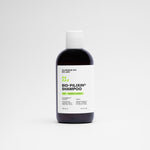Menopause is a natural phase in a woman's life that brings about hormonal changes, which can affect the health and appearance of the hair. Many women going through menopause experience hair damage, dryness, and thinning. In this article, we will address the question "What is the best hair repair for menopause hair?" and provide insights into effective hair repair treatments that can help restore and rejuvenate menopausal hair.
Table of content
What is the best hair repair for menopause hair?
When it comes to finding the best hair repair solution for menopausal hair, it is crucial to consider treatments that target specific concerns related to hair damage and promote overall hair health. Here are some effective hair repair options:
1. Nutrient-rich hair masks:
Using hair masks that are enriched with nourishing ingredients can help repair and revitalize menopausal hair. Look for masks that contain ingredients such as argan oil, coconut oil, shea butter, or avocado oil. These ingredients provide essential nutrients, hydration, and moisture to the hair, promoting repair and rejuvenation.
2. Protein treatments:
Protein treatments are beneficial for menopausal hair that has been damaged and weakened. These treatments help strengthen the hair shaft and minimize breakage. Look for protein-based treatments that contain ingredients like keratin or hydrolyzed wheat protein. These proteins can penetrate the hair shaft, repair damage, and improve the overall health and appearance of the hair.
3. Scalp treatments:
The health of the scalp plays a crucial role in the overall condition of the hair. Menopausal hormonal changes can lead to dryness, itchiness, or an imbalanced scalp. Scalp treatments containing ingredients like tea tree oil, peppermint oil, or salicylic acid can help soothe the scalp, reduce inflammation, and promote a healthy environment for hair growth.
4. Laser therapy:
Laser therapy is an effective non-invasive treatment option for menopausal hair repair. Low-level laser therapy (LLLT) stimulates blood circulation to the hair follicles, promoting hair growth and reducing hair thinning. This treatment can be done at home using handheld devices or by visiting a professional clinic for more intensive sessions.
5. Prescription medications:
In some cases, hair loss during menopause may require medical intervention. Certain prescription medications, such as minoxidil, can help stimulate hair growth and slow down hair loss. It is important to consult with a healthcare professional or a dermatologist to determine if prescription medications are appropriate for your specific hair repair needs.
As your leading source for hair health information over the past 4 years, we never compromise on accuracy. When it comes to your health, you deserve information you can truly rely on - and earning your trust is our top priority.
Here's how Scandinavian Biolabs ensures every piece of content meets the highest standards of accuracy and integrity:
- Credentialed Experts: Our reviewers are actively practicing doctors and medical researchers
- Stringent Reviews: Content undergoes rigorous editing by subject specialists and review by a practicing doctor.
- Evidence-Based: We rely on well-established research from trusted scientific sources like peer-reviewed journals and health authorities.
- Full Transparency: Our editorial standards, writer credentials, reviewer credentials, correction process, and funding are all publicly documented.
- Independent Voice: While we do promote products, we operate in a vacuum to business operations. Our main goal is just an unwavering commitment to providing medically-sound guidance.
You can count on Scandinavian Biolabs to consistently deliver the trustworthy health information you deserve. Read our Editorial Standards.
Additional tips for menopausal hair repair:
In addition to the above treatments, there are several lifestyle and hair care practices that can contribute to menopausal hair repair. Consider the following tips:
1. Gentle hair care routine:
Avoid harsh hair treatments, excessive heat styling, and tight hairstyles that can further damage the hair. Use a wide-toothed comb or a brush with soft bristles to prevent unnecessary hair breakage.
2. Balanced diet:
Eating a well-balanced diet rich in vitamins, minerals, and proteins is essential for healthy hair growth and repair. Include foods like leafy greens, fruits, lean proteins, and omega-3 fatty acids to provide the necessary nutrients for your hair.
3. Stay hydrated:
Proper hydration is crucial for the health of your hair. Drink an adequate amount of water daily to keep your body and hair hydrated.
4. Protect from sun and heat:
UV rays from the sun and excessive heat can damage the hair. Protect your hair by wearing a hat or using UV-protective hair products when spending time outdoors. Additionally, use heat protectant sprays or serums before using heat styling tools.
5. Manage stress:
Stress can contribute to hair loss and damage. Practice stress-management techniques such as exercise, meditation, or engaging in hobbies to reduce stress levels and promote overall well-being.
Conclusion:
Menopausal hair damage and hair loss can be distressing, but there are effective hair repair options available. Nutrient-rich hair masks, protein treatments, scalp treatments, laser therapy, and prescription medications can help repair and rejuvenate menopausal hair. Additionally, adopting a gentle hair care routine, maintaining a balanced diet, staying hydrated, protecting the hair from sun and heat, and managing stress levels can contribute to the overall health and repair of menopausal hair. If you have concerns about your menopausal hair and the best hair repairfor your specific needs, it is advisable to consult with a healthcare professional or a dermatologist who can provide personalized recommendations and guidance.
Push Back Menopausal Hair Thinning Now
Are you experiencing thinning hair due to menopause? You're not alone. Our Hair Strength Shampoo is exactly what you're looking for.
Made with naturally-derived ingredients, this gentle shampoo cleanses without stripping your hair. It helps reduce excess sebum for a balanced scalp, promoting a healthy environment for hair growth.
Experience stronger, more vibrant hair with our Hair Strength Shampoo. Feel the difference with a formula that's safe for daily use and gentle enough for even the most sensitive scalps.
Don't wait - regain your confidence and embrace beautiful hair again. Try Scandinavian Biolabs Hair Strength Shampoo today!
Read more:






